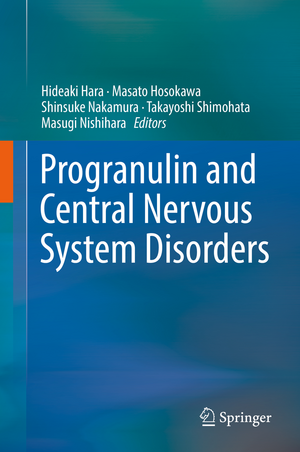Progranulin and Central Nervous System Disorders
Editat de Hideaki Hara, Masato Hosokawa, Shinsuke Nakamura, Takayoshi Shimohata, Masugi Nishiharaen Limba Engleză Hardback – 2 apr 2019
| Toate formatele și edițiile | Preț | Express |
|---|---|---|
| Paperback (1) | 710.06 lei 43-57 zile | |
| Springer Nature Singapore – 14 aug 2020 | 710.06 lei 43-57 zile | |
| Hardback (1) | 668.40 lei 38-44 zile | |
| Springer Nature Singapore – 2 apr 2019 | 668.40 lei 38-44 zile |
Preț: 668.40 lei
Preț vechi: 703.57 lei
-5% Nou
Puncte Express: 1003
Preț estimativ în valută:
127.92€ • 133.05$ • 105.60£
127.92€ • 133.05$ • 105.60£
Carte tipărită la comandă
Livrare economică 09-15 aprilie
Preluare comenzi: 021 569.72.76
Specificații
ISBN-13: 9789811361852
ISBN-10: 9811361851
Pagini: 118
Ilustrații: VII, 183 p. 37 illus., 13 illus. in color.
Dimensiuni: 155 x 235 mm
Greutate: 0.45 kg
Ediția:1st ed. 2019
Editura: Springer Nature Singapore
Colecția Springer
Locul publicării:Singapore, Singapore
ISBN-10: 9811361851
Pagini: 118
Ilustrații: VII, 183 p. 37 illus., 13 illus. in color.
Dimensiuni: 155 x 235 mm
Greutate: 0.45 kg
Ediția:1st ed. 2019
Editura: Springer Nature Singapore
Colecția Springer
Locul publicării:Singapore, Singapore
Cuprins
Chapter 1. Molecular and Functional Properties of Progranulin.- Chapter 2. Progranulin as a biomarker for neurodegenerative diseases.- Chapter 3. PGRN and FTLD.- Chapter 4. PGRN and neurodegenerative diseases other than FTLD.- Chapter 5. Progranulin Regulations of Lysosomal Homeostasis and its Involvement in Neurodegenerative Diseases.- Chapter 6. Molecular and Functional Properties of Progranulin.- Chapter 7. PGRN and neuroinflammation.- Chapter 8. Neural Stem/Progenitor Cells and Progranulin.- Chapter 9. Generation and phenotyping of progranulin-deficient mice.- Chapter 10. Pleiotropic protective effects of progranulin in the treatment of ischemic stroke.- Chapter 11. New therapeutic approaches against ocular diseases.
Notă biografică
Hideaki Hara, Department of Biofunctional Evaluation, Gifu Pharmaceutical University, Japan
Masato Hosokawa, Department of Dementia and Higher Brain Function, Tokyo Metropolitan Institute of Medical Science, Japan
Shinsuke Nakamura, Department of Biofunctional Evaluation, Gifu Pharmaceutical University, Japan
Takayoshi Shimohata, Department of Neurology and Geriatrics, Gifu University Graduate School of Medicine, Japan
Masugi Nishihara, Department of Veterinary Physiology, Graduate School of Agricultural and Life Sciences, The University of Tokyo, Japan
Masato Hosokawa, Department of Dementia and Higher Brain Function, Tokyo Metropolitan Institute of Medical Science, Japan
Shinsuke Nakamura, Department of Biofunctional Evaluation, Gifu Pharmaceutical University, Japan
Takayoshi Shimohata, Department of Neurology and Geriatrics, Gifu University Graduate School of Medicine, Japan
Masugi Nishihara, Department of Veterinary Physiology, Graduate School of Agricultural and Life Sciences, The University of Tokyo, Japan
Textul de pe ultima copertă
This book presents the latest knowledge on the roles of progranulin (PGRN) in normal physiology and pathology and explores the emerging significance of PGRN as a therapeutic target and biomarker in various CNS disorders, including frontotemporal lobe degeneration and other neurodegenerative diseases. Following initial recognition of the importance of PGRN in sexual differentiation of the developing brain and adult neurogenesis, it was subsequently discovered that PGRN acts as a chaperone of lysosomal enzymes and plays a crucial role in maintaining cellular protein homeostasis. It has also been found that sex steroids modulate the expression of PGRN and its trophic effects in the developing CNS and that PGRN directly or indirectly influences neural stem and progenitor cells. Against this background, deeper understanding of the molecular and functional properties of PGRN would provide fresh impetus for the development of mechanism-based therapeutic approaches formultiple disorders. Medications targeting the recovery of lysosomal function appear to hold particular promise in patients with neurodegenerative diseases resulting from PGRN insufficiency. In examining multiple aspects of this fascinating field, the book will be of high value for researchers and graduate students.
Caracteristici
Reviews the effects and mechanisms of action of progranulin Explores the value of progranulin as a therapeutic target Discusses emerging treatment approaches for CNS disorders
